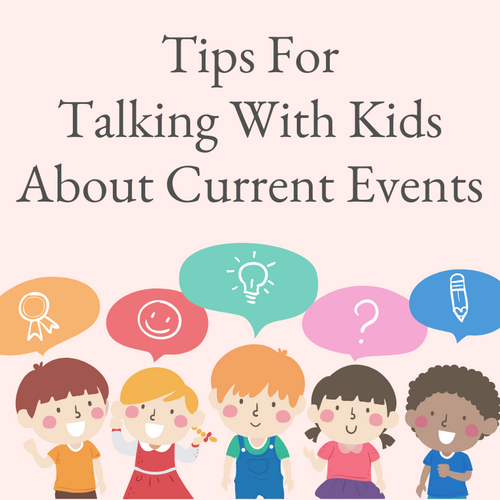Ever wonder how to talk to your littles, big and small, about events they may see or hear about? Dr. Lara Jakobsons from the Center for Mind Health suggests talking about any traumatic event openly and honestly. Find out what your child knows and allow them to ask questions in a non-judgmental space.
In situations like this, there are also specific things to consider when talking with your child.
Allow yourself to feel your emotions. Collect yourself before initiating a conversation.
Take your child’s lead. Acknowledge that a tragedy occurred, allow the child to direct the conversation. Remember, there is no “perfect” thing to say. Listen and make space for conversation.
Focus on safety and security. Reassure your child that places like schools, grocery stores, and outdoor events are typically very safe.
Validate their feelings. Share that you were also scared, worried, or (insert your own feeling here), no emotion is “wrong.”
Maintain a typical routine. Be mindful of any changes in sleep, appetite, or behavior that may indicate increased anxiety.
Give your child a sense of control. If your child is exhibiting symptoms of anxiety, teaching them relaxation strategies may help them to experience a sense of control (e.g., belly breathing).
Signs that your child may be experiencing symptoms of trauma and would benefit from additional evaluation and support include:
Cognitive. Increased thoughts of death, dying or negative events, or a focus on safety. Changes in concentration may also be apparent.
Emotional. Increased sadness, as well as feeling on edge, anxious, or irritable.
Behavioral. Avoiding activities they normally love. Experiencing changes in sleep or appetite. Other behavioral symptoms may include changes in relationships such as isolating, clinginess or defiant behavior.
Physical. Panic attacks, stomachaches, headaches, and pains may be physical signs of emotional distress.
For more information on this topic, Dr. Jakobsons has provided the following resources:
Tips for Talking with Children https://store.samhsa.gov/sites/default/files/d7/priv/sma12-4732.pdf
Help Children Manage Distress https://www.apa.org/topics/gun-violence-crime/shooting-aftermath
Guidelines for Helping Youth https://www.nmvvrc.org/media/3tmbuhke/parents_guidelines_for_helping_youth_after_the_recent_shooting.pdf
Talking to Children about Violence https://www.nasponline.org/resources-and-publications/resources-and-podcasts/school-safety-and-crisis/school-violence-resources/talking-to-children-about-violence-tips-for-parents-and-teachers
Dr. Lara Jakobsons is a Licensed Clinical Psychologist and Founder of the Center for Mind Health. She has presented talks nationally and has over 15 years of clinical experience providing treatment. Dr. Jakobsons received her B.A. from Georgetown University and Ph.D. from Florida State University. Dr. Jakobsons previously served on faculty at the University of Illinois at Chicago and the University of Chicago Pritzker School of Medicine where she enjoyed lecturing and training students. Prior to starting the Center for Mind Health, she held administrative responsibilities as the Program Director for Parent and Adolescent DBT Services at NorthShore University HealthSystem. In her private practice, Dr. Jakobsons enjoys working with young adults and parents. Her specialties include weight management, parenting, anxiety, and ADHD.
FIT4MOM Oak Park River Forest offers fitness classes for women in all stages of motherhood, including prenatal, stroller & moms only classes. Your first class is free! Click here to try a class.

